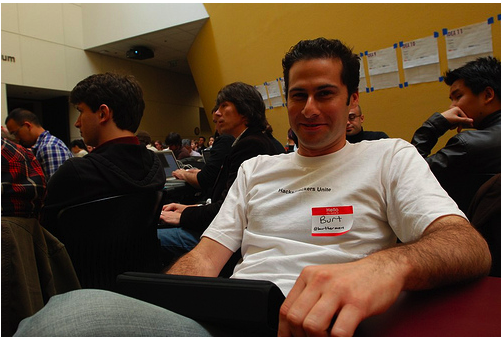Burt Herman:||“We should apply technology lessons to journalism”
How to make journalists and hackers work together, and why? Some answers given by Burt Herman, founder of Hacks/Hackers.
Hacks/Hackers’ founder speaks to OWNI about his brainchild, a group that tries to connect journalists and technologists. He talks about the genesis of the initiative during a Knight journalism Fellowship year. He says he is going to turn it into a non-profit organization and, in the same time, he explains he is co-founding a for-profit startup.

Burt Herman (picture by Tony Deifell)
How did you come up with the idea of Hacks and Hackers?
The idea came to me after spending a year as a Knight journalism fellow at Stanford University. Journalism is in a state of upheaval, and we now have an amazing opportunity to reshape how news is gathered and consumed. Everyone can be a reporter when news happens, sending Tweets, and uploading photos and video from smartphones. But journalists are still needed to help make sense of it all, and technology can help them cope with this massive wave of information. Also, computer scientists are learning so much about how people interact with technology, and we should be applying those lessons to journalism.
Why this name?
The name began with “hackers” — I knew I wanted to use that because a true hacker is someone who uses whatever it takes to get the job done. In Silicon Valley, it’s a positive word for a skilled computer developer. I tried to think of a journalism word that would go together with that, and decided on “hack” — which is slang for a journalist in a tongue-in-cheek way. The name Hacks/Hackers embodies the grassroots spirit of the organization.
How did you start?
I created a group on meetup.com and had the first meeting in November at a bar in San Francisco. From there, it grew quickly and we now have more than 600 members spread across the world. We’ve held Hacks/Hackers-related meetings also in Chicago and Washington DC, and the first New York event is set for June 2.
What do you do concretely to pursue your goal to connect geeks and journos?
We’ve held monthly get-togethers that have drawn dozens of people from top technology companies like Google, Yahoo and Twitter, along with local newspapers like the San Francisco Chronicle and San Jose Mercury News, and also technology and journalism startup companies.
This weekend we held our first storytelling/hacking workshop to develop news applications for the iPad and tablet devices. More than 80 people worked in teams and built 12 apps in less than 36 hours. At the end of the event, the teams have presented their work to a panel of judges that includes a venture capitalist, technology entrepreneur and journalists. The winning projects were a children’s news application and a site with news stories about your political representatives based on your location.
I am also turning words into actions and launching my own company relating to journalism and technology, where I am co-founder of a startup together with Xavier Damman, a Belgian developer now living San Francisco. We are working to develop journalism applications and our first product is Publitweet, which takes Twitter and makes it more easily readable for non-Twitter users. The application is already in use on top French-language sites including Le Monde and Liberation, and also Le Soir in Belgium, along with other news sites in the U.S.
We are working on our next generation application that will make it easy for journalists, bloggers and anyone to create stories using content from the social Web. We want to empower journalists so they can concentrate on what they do best, and give them great technology tools and a way to earn a living.

Hacks and Hackers, this week-end
Would you tell us a funny story or an anecdote illustrating the spirit of H/H?
It turned out I wasn’t the first to think of this name. Two leaders in the journalism technology community — Aron Pilhofer of The New York Times and Rich Gordon from Northwestern University’s Medill school of journalism — had also proposed this name for an online community. The coincidence was pointed out by other journalists on Twitter, so we eventually got in touch and decided to join efforts.
The great thing about this community is that everyone wants to help each other. We’ve launched a question-and-answer site at for media technology issues that has been growing quickly. People realize that we can gain much more by working together and learning from each other.
How do you finance H/H?
I’ve been paying for it myself so far, asking for donations at events and finding some sponsors. We’re working now to turn Hacks/Hackers into a non-profit organization, and are looking for sponsors and foundations to support our initiatives to build the future of journalism.
Initiatives like yours are quite rare in Europe where journalism world often looks to be in an ivory tower. Do you think this initiative it’s ‘exportable’ to Europe too?
Yes! We’ve already had interest from people in Europe who have signed up for the group. We would be delighted to expand there and cooperate with local journalists to produce events. I worked around the world as a bureau chief and correspondent for The Associated Press for 12 years, and would be happy to help bring together journalists and technologists everywhere. Journalism and open information are essential for society to function, keeping governments and companies accountable to their citizens.
This interview is also avalaible in french here
Photos CC Flickr by cstmweb

Laisser un commentaire